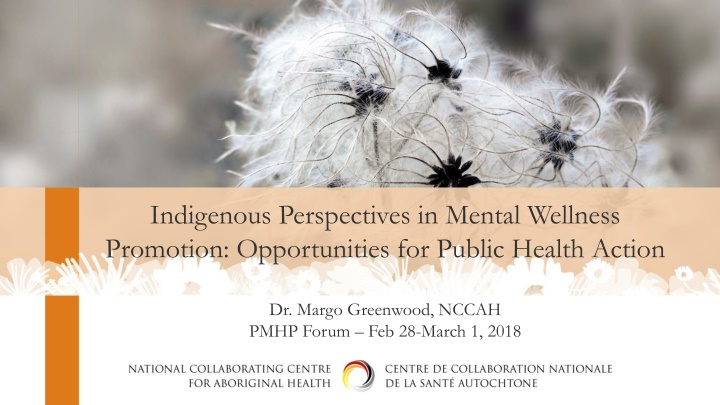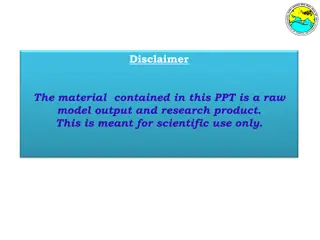
Indigenous Perspectives in Mental Wellness Promotion
Explore Indigenous perspectives on mental wellness promotion, highlighting the balance of mental, physical, spiritual, and emotional dimensions for self-harmony. Dive into the challenges faced by Indigenous children and youth in health disparities and understand the unique mental health challenges and strengths across different Indigenous communities. Discover the impact of colonialism on Indigenous health realities and the protective factors promoting resilience at individual, community, and societal levels.
Download Presentation

Please find below an Image/Link to download the presentation.
The content on the website is provided AS IS for your information and personal use only. It may not be sold, licensed, or shared on other websites without obtaining consent from the author. If you encounter any issues during the download, it is possible that the publisher has removed the file from their server.
You are allowed to download the files provided on this website for personal or commercial use, subject to the condition that they are used lawfully. All files are the property of their respective owners.
The content on the website is provided AS IS for your information and personal use only. It may not be sold, licensed, or shared on other websites without obtaining consent from the author.
E N D
Presentation Transcript
Indigenous Perspectives in Mental Wellness Promotion: Opportunities for Public Health Action Dr. Margo Greenwood, NCCAH PMHP Forum Feb 28-March 1, 2018
Declaration of real or potential conflicts of interest Presenter: Margo Greenwood I have no real or potential conflict of interest related to the material that is being presented today.
Indigenous Concepts of Health and Wellness A balance of the mental, physical, spiritual, and emotional dimensions of self and the ability to live in harmony with family, community, nature, and the environment (King, Smith, Gracey, Lancet, 2009) Self esteem and personal dignity flowing from harmonious physical, emotional, mental and spiritual wellness and cultural identity (ITK, 2014)
Indigenous Children and Youth Disproportionate burden of ill-health Data limitations Culturally relevant indicators Jurisdictional barriers - surveillance Geographic and demographic representation Emphasis on disease and illness, not wellness and prevention
Mental Health Challenges and Strengths Vary immensely among communities and individuals Reflects distinctiveness of First Nations, Inuit and Metis worldviews and experiences Determinants of health intersect and manifest differently across lifespan and generations Knowledge Gaps Gender differences and transitions to adulthood LGBTQ2S populations Transgenerational impacts of residential schools Ongoing adversity
Beyond the Social Indigenous knowledges and ways of being as the primary frame of reference for understanding Indigenous health realities Colonialism as an active and ongoing force in lives of Indigenous peoples
Protective Factors Attributes or conditions at the individual, family, community of societal level than promote resilience and decrease risk factors Community Individual Cultural continuity - Self-government - Band control of services - Culture and language - Identity Self-reliance Self-confidence Community involvement Mentorship Kim and community relationships
Characteristics of Successful Mental Health Promotion Indigenous Contexts Address underlying determinants Emphasize strengths and resilience Focus on protective factors Indigenous Processes Community- driven and owned Build capacity and leadership Meaningfully engage children, youth, families and communities Indigenous Concepts Holistic Incorporate Indigenous values, knowledges, cultural practices
Public Health Roles Talk to Indigenous peoples and organizations to learn about their diverse perspectives on mental wellness (Boska et al, 2015) Learn about the social and cultural contexts of Indigenous communities (Boska et al, 2015) Commit to providing culturally-safe care Support Indigenous mental wellness workers Advocate for Indigenous heath equity Understand programs must be guided by local Indigenous knowledges Share knowledge on promising practices in Indigenous communites
Thank-you Browse our publications using the QR code above or go to nccah-ccnsa.ca/34/Publications.nccah

